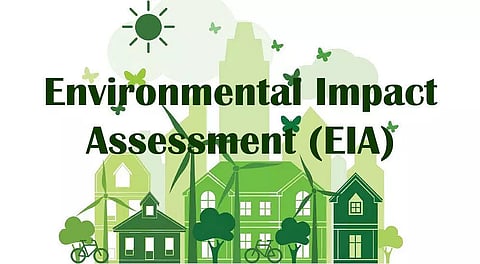
- Home
- Live Blog
- Breaking News
- Top Headlines
- Cities
- NE News
- Sentinel Media
- Sports
- Education
- Jobs

GUWAHATI: Balipara Foundation has said that the EIA (Environment Impact Assessment) 2020 has gone against the sole motive and basic principle of the Environment Protection Act, 1986.
In a statement issued to the media, the Foundation said, "Forests have been a lifeline of the mankind from the very beginning of civilization – providing land, energy, water, fuel, livelihoods and medicines for billions across the globe. Forests are also the only answer towards any climate action that needs to be taken now and in the coming years. They have been a buffer between generating clean air and absorbing human-caused pollution. Thus, forests could do a lot more significantly for a resilient society and mitigating impacts of climate change.
"Environmental Impact Assessment is an important process to evaluate the environmental impact of a proposed project. It is an essential decision-making tool for the approval of any initiative taken up by the government or private sector entity. The EIA is important as a legal framework for putting forth basic responsibilities of citizens and authorities, keeping a check on quality of projects and its impact by assessing risks at all costs whether it includes people, ecology or economy. However, the recent EIA that was drafted has many matters leading to a violation of the sole motive and basic principle of the 1986 Environment Protection Act. The three most debated contentions put forth are:
(1) post-facto approval – loss of identity, increase in global warming transitions, increase in invasive species disbalance in atmospheric nitrogen and displacement of indigenous livelihoods, (2) public consultations: prohibition from any public hearing, for example: linear projects like road making or pipelines, (3) compliance with report issues. However, the Government has clearly mentioned that the new draft is being brought forth to make the process more transparent and expedient with rationalization and standardization of the process."
It also said that the Eastern Himalayan region has the origin of agro-based solutions bringing in the element of large-scale food supply chains along with a sense of commune inclusive of food security. "The indigenous community members are farmers who depend on their land for a source of income and in some cases – a complete hand-to-mouth existence. If we consider the Eastern Himalayan businesses to be green in nature and continue to do the same, unlike other conventional industrial practices, the following could be the results:
(1) Transformation within the food, land and marine use system acquisitioning the potential to create business opportunities worth almost $3.6 trillion and 191 million new jobs over the next 10 years.
(2) Five transitions across infrastructure and the built environment could generate $3 trillion and 117 million jobs by 2030.
(3) About $3.5 trillion and 87 million jobs could be generated by 2030. (Source: WEF 2020 report: The Future of Nature and Business)," the statement said.Also Watch: #NewsMakers: Discourse on Saving Dehing-Patkai